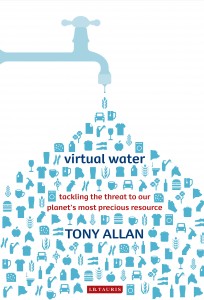MONDAY, 24 OCTOBER 2011
Since an astonishing 90% of our water use is due to the food we eat, Allan spends much of the book talking about food rather than water. Meat is particularly water hungry. In the UK, the average meat-eater uses 2300 litres more water per day than a vegetarian. Alarmingly, if the cultural tendency for vegetarianism amongst the burgeoning population of India is reversed by rising affluence, the world will face huge problems of water scarcity. Furthermore, a third of all food purchased in advanced economies is thrown away and a similar fraction of the food grown in developing economies is lost due to inadequate storage facilities. Yet the demand for food at the predicted peak global population is only expected to rise by 40%. As Allan explores these issues by way of eight example countries, he regularly drifts into the stumbling blocks of national politics and the pitfalls of international trade.One gets the impression that Allan is offering a prescient warning about an impending catastrophe. As Allan says himself, “I’m doing my equivalent of shouting from the rooftops”. And to this end, the book is eminently readable: the prose is littered with metaphor and short sentences are clearly his forte. But one also feels that he never quite makes it to his punch line: there are few concrete statistics about future global water use (perhaps because they are simply too difficult to compile). Furthermore, the rambling chapters, forced puns and undercurrent of left wing cynicism begin to tire after a few hundred pages.
But rhetoric aside, Allan touches on some salient points. Just as Marx highlighted the failure of capitalist markets to account for the cost of labour, we must, and are only slowly beginning to, quantify environmental costs within our economic systems. Similarly, the knee-jerk reaction to manage supply, be it energy, food or water, rather than address our greedy demand must change.
If Allan is right, we should be as worried by our water footprints as our carbon ones.
Written by Tim Middleton

